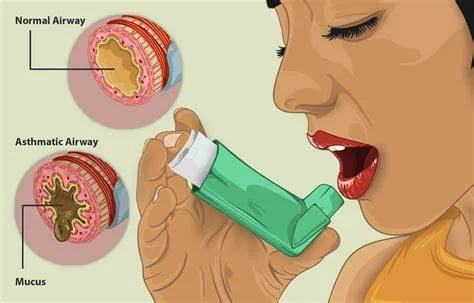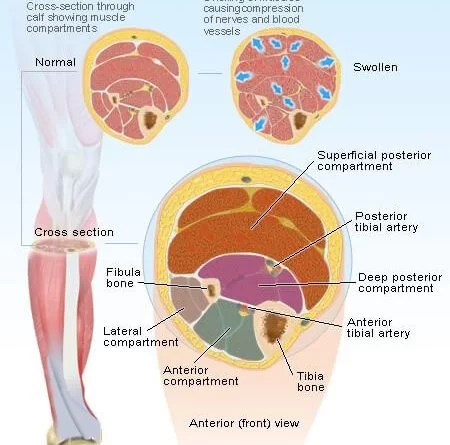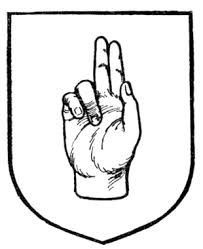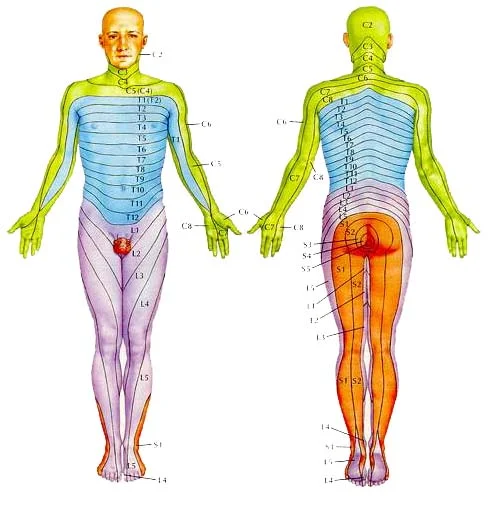Asthma
Table of Contents
What is asthma?
- Asthma is an inflammatory disease of the airways to the lungs.
- It creates breathing difficult & can make certain physical activities challenging or even impossible.
- According to the Centers for Disease Control & Prevention (CDC), about of 25 million Americans, a trusted source has asthma.
- It is the most usual chronic condition among American children: 1 child out of every 12 trusted sources has asthma.
- To understand asthma, it is necessary to understand a little about what occurs when you breathe.
- Normally, with every breath you take, air goes through your nose or mouth, down into your throat, and into your airways, at the end making it to your lungs.
- There are lots of little air passages in your lungs that assist deliver oxygen from the air into your bloodstream.
- Asthma symptoms happen when the lining of your airways swells & the muscles around them tighten.
- The mucus then fills the airways, further less amount of air that can pass through.
- These conditions can then bring on asthma “attack,” which is the coughing and tightness in the chest that is usual of asthma.
- Asthma is a long-term disease of the lungs.
- It causes your airways to get inflamed & narrow, and it creates it hard to breathe.
- Severe asthma can cause trouble in talking or being active.
- You might hear your doctor call it a chronic respiratory disease.
- Certain people refer to asthma as “bronchial asthma.”
- Asthma is a serious disease that affects about 25 million Americans and causes nearly 1.6 million emergency room visits every year.
- With treatment, you can live very well.
- Without it, you might have to go to the ER sometime or stay at the hospital, which can affect your daily life.
What are the symptoms of Asthma?
- The most usual symptom of asthma is wheezing.
- This is a squealing or whistling sound that happens when you breathe.
Other asthma symptoms may involve:
- coughing, especially at night, when laughing, or during exercise,
- tightness in the chest
- shortness of breath
- difficulty talking
- anxiousness or panic
- fatigue
- chest pain
- rapid breathing
- frequent infections
- trouble sleeping.
- The type of asthma that you have can regulate which symptoms you experience.
- Some people experience symptoms consistently throughout the day.
- Others may find that certain activities can create symptoms worse.
- Not everyone with asthma will experience these specific symptoms.
- If you think the symptoms you are experiencing could be a sign of a condition like asthma, make an appointment to see your doctor.
- Also, keep in mind that even if your asthma is well-managed, you may also occasionally experience flare-ups of symptoms.
- Flare-ups often improve with the use of quick-acting treatments, like an inhaler, yet may require medical attention in severe cases.
Signs of an asthma flare-up may involve:
- coughing
- wheezing
- throat clearing
- difficulty sleeping
- chest pain or tightness
- fatigue.
- If your symptoms worsen or do not improve with the use of an inhaler, you should seek immediate medical treatment.
You should also seek treatment if you experience symptoms of an asthma emergency, involving:
- severe breathing difficulty
- gasping for air
- confusion
- pale lips or fingernails
- dizziness
- difficulty walking or talking
- blue lips or fingernails
What are the Causes and triggers of Asthma?
- Although asthma is especially common in children, many people do not develop asthma until they are adults.
- Not any one cause has been identified trusted source for asthma. Instead, researchers believe it is caused by a variety of factors.
These factors involve:
- Genetics: If a parent or sibling has asthma, you are more likely to develop it.
- History of viral infections: People with a history of severe viral infections during childhood, like as respiratory syncytial virus infection (RSV), may be more likely to develop the condition.
- Hygiene hypothesis: This theory explains that when babies are not exposed to enough bacteria in their early months & years, their immune systems do not become strong enough to fight off asthma & other allergic conditions.
- Many factors can also trigger asthma & cause symptoms to worsen. Triggers for asthma can differ & some people may be more sensitive to certain triggers than others.
The most common triggers involve:
- health conditions, like as respiratory infections,
- exercise
- environmental irritants
- allergens
- intense emotions
- extreme weather conditions
- pests
- certain medications, including aspirin or non-steroidal anti-inflammatory drugs (NSAIDs).
What is the diagnosis of Asthma?
- There is no single test or exam that will determine if you or your child has asthma. Instead, your doctor will use different criteria to determine if the symptoms are the result of asthma.
The following can assist diagnose trusted source asthma:
- Health history: If you have family members with a breathing disorder, your risk is very higher. Alert your doctor about this genetic connection.
- Physical exam: Your doctor will listen to your breathing with the stethoscope. You may too be given a skin test to look for signs of an allergic reaction, such as hives or eczema. Allergies increase your risk for asthma.
- Breathing tests: Pulmonary function tests (PFTs) measure the airflow into & out of your lungs. For the most usual test, spirometry, you blow into a device that measures the speed of the air.
- Doctors do not typically perform breathing tests on children under five years of age because it is difficult to get an accurate reading.
- Instead, they may prescribe asthma medications to your child & wait to look if symptoms improve. If they do, your child likely has asthma.
- For adults, your doctor may prescribe a bronchodilator or other asthma medication if test results indicate asthma. If symptoms improve with the use of this medication, your doctor will continue to treat your condition as asthma.
- Your doctor will also require to determine the type of asthma you have. The most usual type is allergic asthma, representing a 60 percent trusted source of all cases of asthma.
What are the types of Asthma?
- Additional types of asthma are related to the person’s stage in life. Though asthma can appear at any age, pediatric asthma specifically affects children & adult-onset asthma does not appear until adulthood.
Other specific types of asthma are described below.
Allergic asthma: Allergens trigger this usual type of asthma.
These might involve:
- pet dander from animals such as cats and dogs,
- food
- mold
- pollen
- dust
- Allergic asthma is sometimes seasonal because it goes hand-in-hand with seasonal allergies.
Non-allergic asthma: Irritants in the air not related to allergies trigger this type of asthma.
These irritants might involve:
- burning wood
- cigarette smoke
- cold air
- air pollution
- viral illnesses
- air fresheners
- household cleaning products
- perfumes.
Occupational asthma: Occupational asthma is a type of asthma induced by triggers in the workplace.
These involve:
- dust
- dyes
- gases and fumes
- industrial chemicals
- animal proteins
- rubber latex
- These irritants can exist in a wide range of industries, involving:
- farming
- textiles
- woodworking
- manufacturing.
Exercise-induced bronchoconstriction (EIB)
- Exercise-induced bronchoconstriction (EIB) commonly affects people within a few minutes of starting exercise and up to 10 to 15 minutes later physical activity.
- This condition was before known as exercise-induced asthma (EIA).
- Up to 90 percent of people with asthma also experience exercise-induced bronchoconstriction (EIB), but not everyone with exercise-induced bronchoconstriction (EIB) will have other types of asthma.
Aspirin-induced asthma (AIA)
- Aspirin-induced asthma (AIA), also called aspirin-exacerbated respiratory disease (AERD), is commonly severe.
- It is triggered by taking aspirin or another NSAID, such as naproxen (Aleve) or ibuprofen (Advil).
- The symptoms may start within minutes or hours. People with Aspirin-induced asthma (AIA) also typically have nasal polyps.
- About 9 percent of people with asthma have Aspirin-induced asthma (AIA). It commonly develops suddenly in adults between the ages of 20 & 50.
Nocturnal asthma
- In this type of asthma, symptoms worsen at night.
Triggers that are thought to bring on symptoms at night involve:
- heartburn
- pet dander
- dust mites
- The body’s natural sleep cycle may too trigger nocturnal asthma.
Cough-variant asthma (CVA)
- Cough-variant asthma (CVA) does not have classic asthma symptoms of wheezing and shortness of breath. It is characterized by a persistent, dry cough.
- If it is not treated, cough-variant asthma (CVA) can lead to full-blown asthma flares that include the other more common symptoms.
What is the treatment of Asthma?
- To assist treat asthma, the National Asthma Education and Prevention Program (NAEPP) trusted source classifies the condition based on the severity of previous treatment.
Asthma classifications involve:
- Intermittent: Most people have this type of asthma, which does not interfere with daily activities. Symptoms are mild, lasting fewer than two days per week or 2 nights per month.
- Mild persistent: The symptoms occur more than twice a week — yet not daily — and up to four nights per month.
- Moderate persistent: The symptoms occur daily and at least one night every week, yet not nightly. They may limit certain daily activities.
- Severe persistent: The symptoms happen several times every day and most nights. Daily activities are extremely limited.
Treatments for asthma fall into 4 primary categories:
- quick-relief medications,
- long-term control medications,
- a combination of fast relief & long-term control medications. The most current asthma clinical guidelines trusted source, released in 2020 by the National Asthma Education and Prevention Program (NAEPP), recommends this treatment. However, this treatment is not approved by the Federal Drug Administration (FDA).
- biologics, which are given by injection or infusion commonly only for severe forms of asthma.
Your doctor will recommend one treatment or a combination of the treatments based on:
- the type of asthma you have,
- your age,
- your triggers,
- Your treatment plan may also include learning your triggers, monitoring your symptoms carefully, and taking steps to avoid flare-ups.
Quick-relief asthma treatments
- These medications should only be used in the event of asthma symptoms or an attack. They provide fast relief to assist you to breathe again.
Bronchodilators
- Bronchodilators work within minutes to relax the tightened muscles around your airwaves & decrease the symptoms quickly.
- Although they can be administered orally or injected, bronchodilators are most usually taken with an inhaler (rescue) or nebulizer.
- They can be used to treat sudden symptoms of asthma or taken before exercise to prevent a flare-up.
First-aid asthma treatment
- If you think that someone you know is having an asthma attack, ask them to sit upright and assist them in using their rescue inhaler or nebulizer.
- The dosage will differ depending on the medication. Check the instructions insert to make sure you know how many puffs of medications you require in the event of an attack.
- If symptoms persist for more than 20 minutes, and the second round of medication does not assist, seek emergency medical attention.
- If you frequently require to use quick-relief medications, ask your doctor about another type of medication for long-term asthma control.
Long-term asthma control medications
- These medications are taken daily to assist reduce the number and severity of your asthma symptoms, but they do not manage the immediate symptoms of an attack.
Long-term asthma control medications involve:
- Anti-inflammatories: Taken with an inhaler, corticosteroids and other anti-inflammatory medications assist reduce swelling and mucus production in your airways, making it easier to breathe.
- Anticholinergics: These assist stop your muscles from tightening around your airways. They are usually taken daily in the combination with anti-inflammatories.
- Long-acting bronchodilators: These should only be used in combination with anti-inflammatory asthma medications.
Biologics
- Doctors use biologics to treat severe asthma that does not respond to other medications or to treatment by trigger control.
- They work by targeting personal antibodies in your body. This disrupts the pathway that leads to asthma-causing inflammation.
- There are 5 types of biological medications on the market, and others are in development. These medications require to be administered either by injection or by infusion in your doctor’s office.
Bronchial thermoplasty
- This treatment uses an electrode to heat the trusted source of the airways inside the lungs, assisting to reduce the size of the surrounding muscle and prevent it from tightening.
- This minimally invasive procedure is performed by a doctor in a clinic or hospital and commonly takes around an hour.
- Bronchial thermoplasty is intended for people with severe asthma and can provide relief from symptoms for up to 5 years trusted source.
- However, because it is a relatively new procedure, it is not yet widely available.
What is an asthma attack?
- When your asthma symptoms get progressively worse, it is known as an exacerbation or an asthma attack.
- It becomes increasingly difficult to breathe because the airways are swollen and the bronchial tubes have narrowed.
The symptoms of an exacerbation may involve trusted sources:
- hyperventilation
- cough
- wheezing
- shortness of breath
- increased heart rate
- agitation
- confusion
- blue lips
- Although an exacerbation can end fastly without medication, you should contact your doctor because it can be life-threatening.
The longer an exacerbation continues, the more it can affect of your ability to breathe. That is why exacerbations often require a trip to the emergency room. Exacerbations can be cured by taking medications that help manage your asthma symptoms.
What is the Prevention and management of Asthma?
- Because researchers have but to identify the exact cause of asthma, it is challenging to know how to prevent the inflammatory condition.
- However, more information is known about preventing asthma attacks.
These strategies involve:
- Avoiding triggers: Steer clear of the chemicals, smells, or products that have caused breathing problems in the past.
- Reducing exposure to allergens: If you have identified allergens, like dust or mold, that trigger an asthma attack, avoid them if possible.
- Getting allergy shots: Allergen immunotherapy is a type of treatment that may assist alter your immune system. With routine shots, your body may become a little sensitive to any triggers you encounter.
- Taking preventive medication: Your doctor may prescribe medication for you to take on a daily basis. This medication may be used in addition to the one you use in case of an emergency.
- Your doctor can assist you to put an asthma action plan in place so that you know which treatments to use and when.
- In addition to using maintenance medications, you can take steps each day to assist make yourself healthier & reduce your risk for asthma attacks.
These include:
- Eating a healthier diet: Eating a healthy, balanced diet can assist improve your overall health.
- Maintaining a moderate weight: Asthma tends to be worse in people with overweight and obese. Losing weight is healthy for your heart, your joints, and your lungs.
- Quitting smoking: if you smoke. Irritants like as cigarette smoke can trigger asthma & increase your risk for chronic obstructive pulmonary disease (COPD).
- Exercising regularly: Activity can trigger an asthma attack, yet regular exercise may actually help reduce the risk of breathing problems.
- Managing stress: Stress can be a trigger for asthma symptoms. Stress can too make stopping an asthma attack more difficult.
- Nutrient-rich foods: These foods are vital to assisting reduce symptoms, yet food allergies can trigger asthma symptoms.
When to see a doctor?
- At the moment, there is no cure for asthma. However, there are many effective treatments that can decrease asthma symptoms. Lifestyle changes & medications can also assist improve your quality of life.
- If you have not been diagnosed with asthma but are experiencing symptoms such as wheezing, coughing, or shortness of breath, you should let your doctor know. You can connect to the physician in your area using the Healthline Find Care tool.
- Once you are diagnosed with asthma, you should see your doctor at least once a year or more frequently if you have persistent symptoms later using treatments.
Call your doctor immediately if you have these problems:
- feel weak,
- can not perform daily activities,
- have a wheeze or cough that who not go away.
- It is important to educate yourself about your condition & its symptoms. The more you know, the more proactive you can be in improving your lung function & how you feel.
Talk with your doctors about:
- your type of asthma,
- what triggers your symptoms,
- what daily treatments are best for you,
- your treatment plan for the asthma attack.
Takeaway
- Asthma is a condition that inflames the lungs and makes it difficult to breathe. It can affect both adults and children in different forms and in various levels of severity.
- There are various medications available to treat asthma. The most usual treatments are bronchodilators, which can be short-term to treat an asthma attack or long-term for the management of symptoms over time.
- Lifestyle changes may also assist reduce asthma flare-ups. This can involve dietary changes, exercise, or stress management. Speak with your doctor to identify the type of asthma you may have and the best treatment and management options for you.
FAQs
Asthma is a long-term inflammatory disease of the airways of the lungs. It is characterized by variable and recurring symptoms, reversible airflow obstruction, and easily triggered bronchospasms. Symptoms include episodes of wheezing, coughing, chest tightness, and shortness of breath.
Articles On Asthma. With asthma, there is inflammation of the air passages that results in a temporary narrowing of the airways that carry oxygen to the lungs. This results in asthma symptoms, including coughing, wheezing, shortness of breath, and chest tightness. If it is severe, asthma can result in decreased activity and the inability to talk.
There are lots of small air passages in your lungs that help deliver oxygen from the air into your bloodstream. Asthma symptoms occur when the lining of your airways swells and the muscles around them tighten. The mucus then fills the airways, further reducing the amount of air that can pass through.
Deaths. 397,100 (2015) Asthma is a long-term inflammatory disease of the airways of the lungs. It is characterized by variable and recurring symptoms, reversible airflow obstruction, and easily triggered bronchospasms. Symptoms include episodes of wheezing, coughing, chest tightness, and shortness of breath.
Although asthma is especially common in children, many people do not develop asthma until they are adults.
Not any one cause has been identified trusted source for asthma. Instead, researchers believe it is caused by a variety of factors.








29 Comments